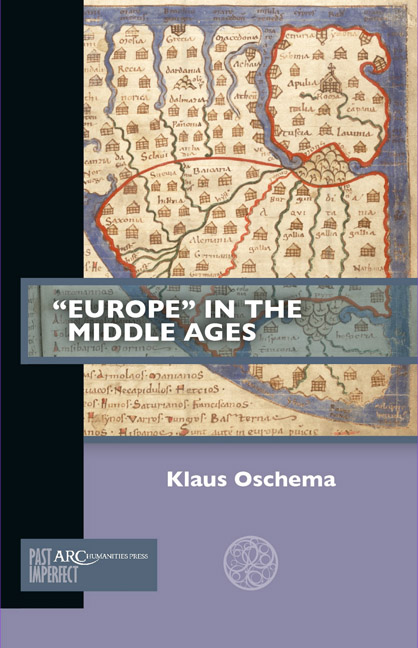Book contents
- Frontmatter
- Contents
- List of Illustrations
- Preface and Acknowledgements
- Chapter 1 Why Europe? A Concept Crossing History and Politics
- Chapter 2 Foundations in Antiquity
- Chapter 3 Moments of Transformation— Europe in the Early Middle Ages
- Chapter 4 Europe, Christianity, or Something Completely Different? Impressions from the Central Middle Ages
- Chapter 5 Our Last Hope? Entangling Europe and Christianity in the Late Middle Ages
- Chapter 6 Perspectives from Outside? Byzantium and the Arabic World
- Conclusion No Roadmap for Europe— History, Politics, and the Way to Global History
- Further Reading
Chapter 1 - Why Europe? A Concept Crossing History and Politics
Published online by Cambridge University Press: 13 February 2024
- Frontmatter
- Contents
- List of Illustrations
- Preface and Acknowledgements
- Chapter 1 Why Europe? A Concept Crossing History and Politics
- Chapter 2 Foundations in Antiquity
- Chapter 3 Moments of Transformation— Europe in the Early Middle Ages
- Chapter 4 Europe, Christianity, or Something Completely Different? Impressions from the Central Middle Ages
- Chapter 5 Our Last Hope? Entangling Europe and Christianity in the Late Middle Ages
- Chapter 6 Perspectives from Outside? Byzantium and the Arabic World
- Conclusion No Roadmap for Europe— History, Politics, and the Way to Global History
- Further Reading
Summary
The title of this short monograph merits explanation. Although the name “Europe” has enjoyed immense popularity in medieval studies from the mid-twentieth century onwards, it is by no means obvious what an analysis of “‘Europe’ in the Middle Ages” might comprise. What's more, the use of the term in medieval studies is far from obvious, as we shall see. On the most general level, recent publications on “Europe in the Middle Ages” can be divided into two categories: the majority seek to describe events and developments that took place in the geographical unit that we now identify as “Europe.” Sometimes they analyze and identify the formation of what is often called a “European culture” or even a “European identity.”
Another series of studies, smaller in number, focuses on the development of the concept (or the idea) of Europe. They do not so much ask “What happened in Europe during the Middle Ages?” or “What were the characteristics of medieval societies in Europe?,” but instead focus on whether the notion (or a concept) of Europe played a role during the period we call the Middle Ages and how this role can be described.
It is the historians’ role to probe sources for answers—but the questions they choose to ask are inevitably informed by the present day. Many authors have searched for the “roots” of the idea of European political unity in the Middle Ages, but the first historians to do so, from the late 1940s onwards, were somewhat disappointed by what they found. Around 1990, when the fall of the Berlin Wall sparked renewed interest in all questions concerning the history and identity of “Europe,” medievalists began synthesizing the findings of these pioneering works. They asserted that the word “Europe” was used quite rarely in the medieval period and that it remained a “purely geographical” notion for most of the time between the fifth and the fifteenth centuries.
In the following pages I will argue that both assumptions are distorted, if not wrong. In order to make a convincing case for the modification of this well-established picture, I would have to present the available sources in much more detail than is possible in this book.
- Type
- Chapter
- Information
- “Europe" in the Middle Ages , pp. 3 - 14Publisher: Amsterdam University PressPrint publication year: 2023



